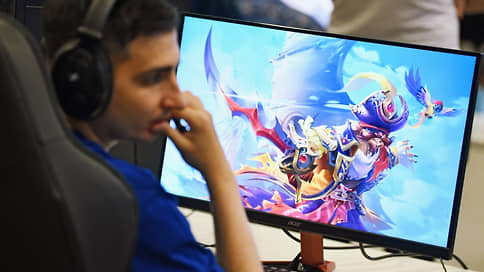Gamers became streamers
[ad_1]

Traffic to video game streaming platforms increased by 30% from March to August in Russia, and the average remuneration to an author from a viewer increased by 24% year-on-year, according to MTS Bank. This is happening against the backdrop of declining Russian interest in buying video games. Market participants and experts consider the streaming market promising in terms of advertising sales. In the short term, the same MTS and VK will fight for leadership in this direction. But they will have to offer streamers convenient metrics, as well as mechanisms for monetization and content promotion.
From March to August, Russian gamers halved the number of purchases of computer and mobile games year-on-year, Kommersant was told at MTS Bank. At the same time, there is a 30% increase in traffic on streaming platforms, as well as an increase in the frequency of donations (remuneration to the author from the viewer) to streamers (by 32% yoy) and the average check (by 25%, to 360 rubles yoy). The MTS WASD streaming platform is seeing a 120% increase in traffic and an 11% increase in average content viewing time to 68 minutes, a company representative added. VK confirms: “If we talk, for example, about the Boosty.to content monetization platform, over the past six months it has shown strong growth in author registrations — ten times.” Major authors continue to come, and with them a paying audience, VK specified.
The hostilities in Ukraine have seriously changed the structure of video game consumption, and also affected the work of traditional distribution channels: Russian gamers began to experience difficulties in buying games through the largest content stores, including Steam. The fact is that users from Russia could not pay for the purchase of games. A number of game studios have stopped selling content for Russian users. Among them, for example, are the British Creative Assemble (the “Total War” line) and the Polish CD Projekt Red (“Witcher” and “Cyberpunk 2077”). When trying to purchase games, Russian Steam users see that the product is not available in their region. Console users are also experiencing problems with the purchase of games: the Japanese Sony has suspended the ability for Russians to buy games and subscriptions in the PlayStation digital store. Against this background, the Russians began to look for workarounds to buy games, including through intermediaries in Turkey, which they find through Russian classifieds (see Kommersant on July 22).
However, the Russians have not only reconsidered the ways of buying video games, but are also showing interest in new streaming sites. After Twitch (owned by Amazon) closed content monetization tools for Russians, Russian streamers, and the audience behind them, began to look for new platforms. One of them was the Trovo of the Chinese Tencent (see Kommersant of April 21).
Kommersant’s interlocutor in the online games market clarifies that Russian streamers and, accordingly, their audience have already begun to move to Russian sites: “The main competition for the audience will unfold between WASD, which has shown a significant increase in recent months, and VK (owns VK. Play, and in August launched a beta version of the streaming service VK.Play.Live.— “b”). For VK, this direction is especially interesting, because the company will be able to draw gamers into its ecosystem, where there is streaming, game distribution and media platforms for monetization.”
According to the head of the Organization for the Development of the Video Game Industry, Vasily Ovchinnikov, in order to attract an audience to their streaming services, Russian companies first of all need to introduce simpler tools for analytics, monetization and promotion of content that are convenient for authors and simpler. “The interest in this segment is understandable: companies are actively integrating their advertising into game streams that keep the target audience,” he says. At the same time, the expert emphasizes, the development of the direction will require viewing statistics services that advertisers will trust, as well as investments in computing infrastructure.
[ad_2]
Source link





